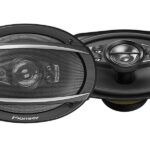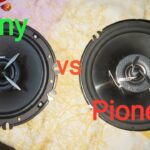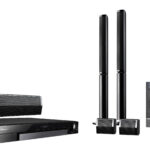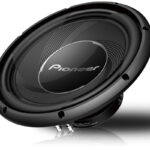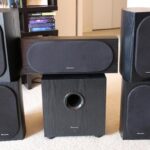For 4 speakers, you will need an amp with at least 4 channels. Looking to connect 4 speakers to your audio system?
In order to ensure optimal sound quality and power distribution, it is crucial to have the right amplifier. An amplifier with at least 4 channels is required to adequately power each speaker. By properly matching the number of speakers with the appropriate amp, you can enjoy an immersive audio experience without compromising on performance.
We will delve into the details of the amp you need for 4 speakers and provide insights to help you make an informed decision. So, let’s get started!
Factors To Consider
When considering the amp you need for 4 speakers, there are a few factors to keep in mind. One important factor is the power requirements of the speakers. Each speaker has a specified power rating, usually measured in watts (W). It’s crucial to choose an amp that can deliver enough power to properly drive all 4 speakers without overpowering or damaging them.
Another factor to consider is impedance matching. The impedance of the speakers should match the output impedance of the amp. This ensures that the power is distributed evenly and that the speakers work efficiently. Mismatched impedance can result in poor sound quality or even damage the speakers or amp.
Speaker sensitivity is also an important consideration. Sensitivity refers to how much sound a speaker produces from a given amount of power. Speakers with higher sensitivity tend to require less power to produce the same volume as speakers with lower sensitivity. This means you may not need an overly powerful amp if your speakers have high sensitivity.
Understanding Amplifier Specifications
Understanding amplifier specifications is crucial when deciding what amp to use for 4 speakers. One important specification to consider is wattage output. This determines how loud the speakers can get and how much power the amplifier can provide. It’s important to match the wattage output of the amp with the recommended wattage range of the speakers.
Another important specification is the ohm rating, which refers to the impedance of the speakers. The amp and speakers should have matching ohm ratings to ensure optimal performance and prevent damage.
Total Harmonic Distortion (THD) is yet another specification to consider. THD measures how much the sound is distorted by the amplifier. Lower THD values indicate cleaner and more accurate sound reproduction.
The signal-to-noise ratio (SNR) is another crucial factor to pay attention to. It measures the amount of noise generated by the amplifier compared to the desired audio signal. A higher SNR means cleaner and clearer sound.
Lastly, the frequency response specification indicates the range of frequencies the amplifier can reproduce. It’s important to choose an amp that can handle the full frequency range of your speakers, ensuring a balanced and accurate sound reproduction.
Different Amplifier Configurations For 4 Speakers
When it comes to powering 4 speakers, there are different amplifier configurations that you can choose from. One option is using a single amplifier with a speaker selector switch. This setup allows you to connect multiple speakers to a single amplifier and control which speakers are active at any given time.
Another option is a multi-zone amplifier, which is designed to power speakers in different zones or rooms. With this configuration, you can have independent volume control and audio sources for each zone.
Lastly, there is bi-amping or tri-amping, which involves using separate amplifiers for different frequency ranges or drivers in each speaker. This allows for more precise control and can result in improved audio quality.
Ultimately, the amp configuration you choose will depend on your specific needs and preferences. Consider factors such as the number of speakers, desired audio quality, and budget when deciding on the right setup for your 4 speakers.
Tips For Setting Up Speakers With Amplifiers
When setting up speakers with amplifiers, there are a few tips to keep in mind. Proper placement and wiring are crucial for achieving optimal sound quality. Ensure that the speakers are positioned correctly within the room to minimize echoes and maximize the listening experience. Additionally, wiring should be done accurately to prevent any signal loss or interference.
Adjusting the volume levels is another important aspect to consider. Each speaker should be adjusted individually to maintain a balanced sound output. This can be done by using the volume control on the amplifier or through a dedicated volume control device.
Furthermore, balancing speaker outputs is essential to avoid overpowering or underpowering certain speakers. The amplifier should be set to evenly distribute power to all the connected speakers, ensuring that they work together harmoniously.
In conclusion, setting up speakers with amplifiers requires careful attention to proper placement, accurate wiring, volume level adjustments, and balancing of outputs. Taking these steps will help you achieve the best sound quality and ensure an enjoyable listening experience.
Frequently Asked Questions
When considering the question, “What amp do I need for 4 speakers?”, there are several frequently asked questions to keep in mind. One common query is whether any amplifier can be used with 4 speakers. The answer is generally yes, as long as the amplifier can handle the total impedance of the speakers.
Another frequently asked question is what happens when using an amplifier with higher wattage than the speakers. It is important to ensure that the speakers can handle the power output of the amplifier, as overpowering them can lead to damage.
Some may wonder if it is better to use a separate amplifier for each speaker. While this may provide more control and power to each individual speaker, it can be more costly and complex to set up.
Lastly, there is the question of connecting speakers with different impedance to the same amplifier. It is generally recommended to connect speakers with similar impedance to avoid potential issues with uneven power distribution.

Credit: www.soundton.com
Frequently Asked Questions
What Size Amp Do I Need For 4 Speakers?
To power 4 speakers, you’ll need an amplifier that can handle the combined output of all 4 speakers. Calculate the total power requirements based on the wattage of each speaker, and choose an amp with equal or greater wattage. Make sure the impedance ratings match for optimal performance.
How Many Watts Do I Need For 4 Speakers?
The wattage you need for 4 speakers depends on the power requirements of each speaker. Add up the wattage of all the speakers to determine the total power needed. It’s recommended to choose an amplifier with slightly higher wattage than the total power requirement to ensure proper headroom and avoid distortion.
Can I Use A Stereo Amp For 4 Speakers?
Yes, you can use a stereo amplifier for 4 speakers, but it will require the use of a speaker selector or switcher. This device allows you to connect multiple pairs of speakers to a stereo amp without damaging the amp.
Make sure to follow the manufacturer’s instructions and properly match the impedance of the speakers.
Conclusion
To ensure optimal sound quality and performance for your 4 speakers, it is crucial to choose the appropriate amplifier. By matching the power requirements of your speakers with the amplifier’s capabilities, you can enhance your audio experience significantly. Consider factors such as impedance, power handling, and speaker sensitivity when selecting the right amp.
Remember, a well-matched amplifier will not only improve the sound output but also protect your speakers from any potential damage.

